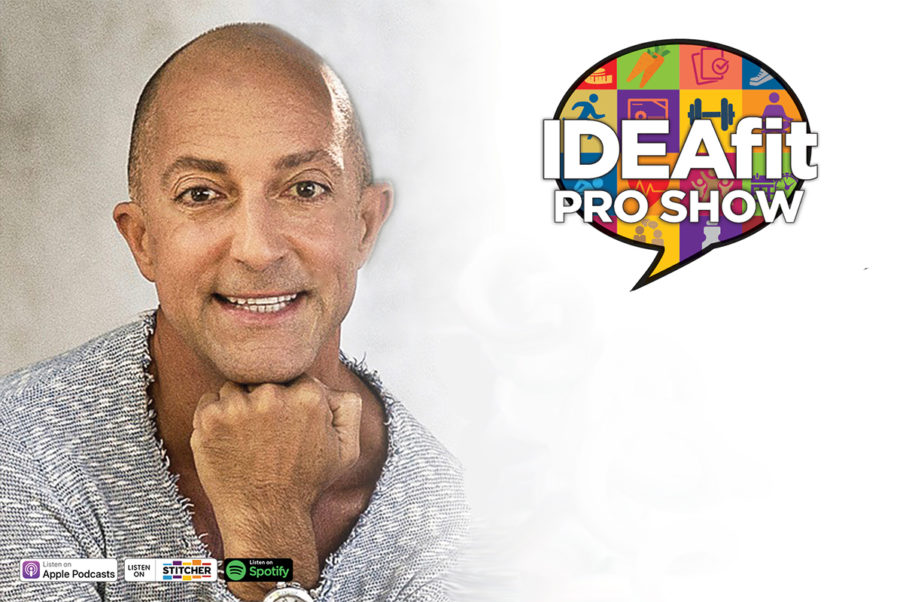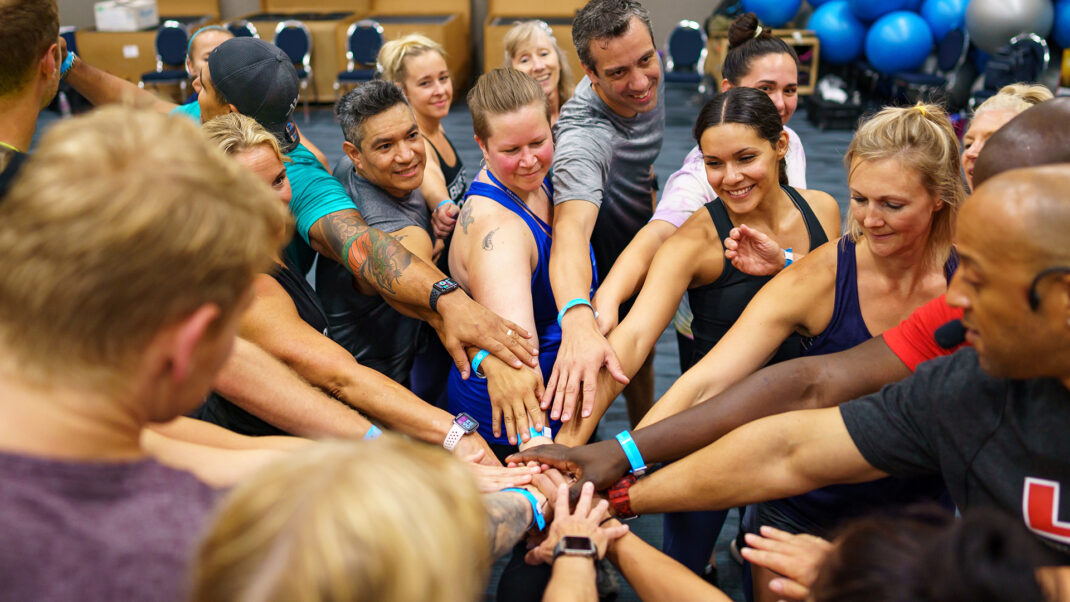How to Find Fitness Business Mentors
This IDEAfit PRO SHOW Podcast excerpt reveals incredible tips for how to find and work with fitness business mentors.

If you are looking to not just survive but to excel and thrive in your fitness career, consider the significance of seeking out fitness business mentors. In a recent episode of the IDEAfit PRO SHOW podcast, host Sandy Todd Webster spoke with mindful movement specialist and speaker, Lawrence Biscontini. His illuminating conversation provides a valuable how-to guide for cultivating relationships with business mentors and discovering the industry secrets that will take your career to the next level.
If you like this piece of the conversation, we invite you to subscribe and download the full episode. Lawrence—who has won major awards across the global fitness industry from IDEA (2004 IDEA Fitness Instructor of the Year), ACE, Canfitpro and ECA—offers world-class secrets in fitness and spa consulting, career growth, and presenting for professional conferences.
Dive into the excerpt below for insightful and practical tips on working with business mentors that you can start applying to your career today.
Note: The excerpt below has been edited for clarity and brevity
Sandy Todd Webster (STW): Since you mentioned mentoring, I’d like to dig into that a bit more. You stated the importance of it, but I’m just wondering, what’s your advice for how a newer—even a seasoned pro—can seek out a mentor? And what are your tips for working with your chosen mentor?
Lawrence Biscontini (LB): So open. Wow. Since we have an hour and 45 left, let me tell you: Paul Chek, who we know and love, talks about the four doctors. I like to talk about the three mentors! “What, Lawrence? I can barely afford one. How are you telling me that I need three mentors?” We do, if you want to soar. You can fly or get by or float, but if you want to soar, you need three business mentors.
Three mentors are paramount to have, of course, with the certifications that we need and all the tools you need. Having fitness mentors is not addressed in the books for certifications. That’s how to do no harm, right? But how to succeed in business and find the other people who know where the bones are buried—Millennials may not understand that metaphor—and who know the secrets of the industry because they made them and paid for them, [is what] we can glean from business mentors.
If you get a Roomba (one of those robots for your floor) or an air fryer or a Japanese rice cooker—I like to use the analogy of those things—but you only know the manual that comes with those, you’re going to be cleaning a very small part of your floor, controlled by your electric device in hand, or only making rice in your Japanese rice cooker, or only using your air fryer for potatoes. However, if you get on YouTube, if you talk to your friends, if you share recipes, your world is blown and your time is well-spent, and you’re not serving something that other people can’t have.
So I believe in three business mentors in our fitness industry: The first is for content, so somebody who teaches the content of what you love to do. Number two is delivery, so somebody who teaches how you love to deliver it—and if you find the same thing in one person that you otherwise call “hashtag fitness god,” then you go for that with a small G. The third mentor you need is somebody outside, the person reading your evaluations of your industry, whose eyes will always be fresh.
For the PRO SHOW, I’m going to reveal for the first time ever my three business mentors because I think it’s great for people to relate to the nuts and bolts of what happens. I go to Len Kravitz for content, and we work out a system where I will say, in public, that he’s my mentor. He’s very sweet also to say, in the backs and fronts of his book, that I am one of his. Very sweet. We have a wonderful, honest relationship. Whenever I do a keynote, he’ll come in and say, “Oh, Lawrence, that was great!” And it’s a script. I’ll say, “Great, thank you, Len. Now, what did you really think?”
Then I cry. And then I process, and then I grow because no one grows by feeling comfortable. You don’t go on holiday, lying with a tequila or whatever in your hand at the beach, and say, “Everything’s comfortable. I’m so glad to be resting. I’m really growing now as a person.” Nah uh! It’s through the suffering that we grow.
So you need to hire somebody who’s content-honest, and that’s Len. He’s researched-based, so if I’m not teaching something that’s research-based I don’t want to do it, unless you’re hiring me to talk about gossip in the fitness industry, and that’s not really who I am. It’s not research-based; it’s just what’s happened to you.
Number two: You hire a mentor for delivery. And that right now [for me] is Mark Fisher. I know you know Mark Fisher and we love Mark Fisher. After I paradoxically and ironically discovered him and introduced him to you and introduced him to a couple other fitness conventions (for which I am super glad that things have worked out in so many ways for him and for IDEA), I hired him to tell me a couple of great things that I need to hear about the delivery. On his YouTube channel, the way he’ll talk to people is so not fingers-up-any-orifices and it’s really not everybody’s vocabulary, but that’s the way I aspire to be. So I take that.
Number three: Connie Towers, my dear friend who’s on General Hospital killing people off when she’s not shooting Hallmark Christmas love movies. She’s the one outside of my industry that not only is one of my three that reads my evaluations, but she’s also one of my people that I’ve dedicated, in some way, in every book I’ve ever written because she teaches me eloquence and how to be what Jay Blahnik calls a “first-class human being.”
So those are my three business mentors. You find them by finding the people who do how and what [you want to do] or are outside of our industry, and you say, “I’d love to discuss possible mentoring relationship opportunities.” Find out if you could work out something. Many times it’s not even a financial exchange, Sandy. You can just say, “Well, you know, I’m really good at massage, or I’m really good at social media. Or how about if I could get you some 50 really nice ‘likes’ from the people that I have on my database?” And pursue whatever it is. I think you have to be creative. Unless your excuses are greater, your why has to be more great.
STW: So creative and resourceful. And thank you for sharing who your mentors are. I’m curious about how you approach them. Was it in person? Was it via email? Knowing you as I do, I’m certain it was probably in person. You just made the ask, but tell me if I’m wrong.
LB: You are correct! Absolutely. With Len Kravitz, he would come to my keynotes and I’d see him in everybody’s keynotes. He is the presenter’s presenter. He appreciates and supports every single person. And I would say to him, “What’d you think?” [He’d say,] “Oh, that was great.” [And I’d say,] “Thank you.” And that was it. The first time we ever had that kind of interaction, I’m thinking, “Nobody thinks a hundred percent that.” Len’s standards are, on a scale of 1–10, a 13.
So I asked, “What do you really think?” And then we’d go back and forth: What could I do for him? I came up with some options. What could he do for me? Continue to tell me his truth based on his eyes and what he knows in the industry.
For Mark Fisher, maybe there was a feeling of gratitude for the idea and the relationships [I provided] that are paying him money moving forward, so he cut me a really great rate for the 30-, 45- and 60-minute conversations that we have, allowing me to bank time, which has also created IDEA listeners. If you get someone on the phone and you’re buying 30, 50 or whatever minutes, always say in advance, “Can I negotiate?”
[Tech interruption]
See also: Career Questions? Enter the Mentor
LB: With Mark Fisher, I think there might’ve been a little bit of friendship and colleague gratitude going on because the introductions I had made are really using his services, like with IDEA in a couple of different ways, and that’s a plethora of introductions.
So he cut me a great rate for the 30-, 45- an 60-minute phone calls. And I think it was kind of visionary [for me] to say, “Before we have this phone call, Mark, can I bank it?” In other words, “Can I cut it in half?” I want 15 minutes today and then maybe 30 or 45 minutes in the future. To all my IDEA friends and family listening, when you’re going to have time with your mentor, suggest that because you’re going to be thinking whirlwinds after your conversation and say, “Oh, but now that spurs this conversation. And what about this? And what about the time I tried that? But I didn’t have time to ask.” It’s sort of like going to confession and you forget that one sin and you beat yourself up, right? Well, no, you’ve already banked time to go back to Mark and say, “Well, I saved my 20 minutes. Here they are.” Always do that.
And it’s not always just about a cash exchange. Remember that when you find the people that do what you do or can offer what you’re willing to pay for in some way, there has to be some kind of energy exchange (which is the buzzword these days).
Remember another acronym: THIS.
T is trust. Trust that your mentor will hold your growth, not your hand. You might cry. You’re not going to a mentor to sugarcoat and give you five great things to keep doing and then the one big thing that’s going to change your life. No, just tell me the 10 big things that are going to make me better. I’ll cry on my own, and I have my own wine cabinet and friend support system to process what you give me. But you have to trust your mentor.
Number two: [H is for] honesty. Give your mentor what will and will not work for you, or what you’re willing and not willing to do. [Don’t] say, “Yeah. What a great idea,” and two months later when you check in, you haven’t even tried and opened up your Twitter account or one in your name.
Number three: [I is for] inquire about compensation regularly. Don’t just think, “Well, I could afford the first call and no more, but my life has changed.” Maybe you have something more creative to offer or suggest the last time.
And number four: [S is for] step up! If you are working with a mentor, do what you say you’re going to do. If somebody says, “Well, you need to post this way, or at least use this hashtag of the 30 you’re allowed to use,” and you haven’t used this … Oh, my goodness, I get so frustrated!
Trust, honesty, inquire and step up!
STW: Another great acronym with a lot of lessons in it. Having a mentor is a way of busting out of your bubble to grow, stretch and expand yourself.
LB: And save money!
STW: Absolutely. You know, that’s one of those career lessons to save yourself frustration and money, is to go straight to a source that you really admire and have them be really honest with you and do the things that they’re suggesting because that’s why you went to them in the first place.
LB: Absolutely. And somebody doesn’t have to have “mentor” on a website. To go up to Keli Roberts [or anyone else] and say, “I’d really love to mentor with you. What are my options? Can we have a discussion?” is great! You just go to their website, and click on the bottom right “contact us” or “contact me.” Go to social media. It doesn’t take a brain surgeon!
See also: How to Make the Most of Internships
Sarah Kolvas
Sarah Kolvas is the content manager for IDEA.





